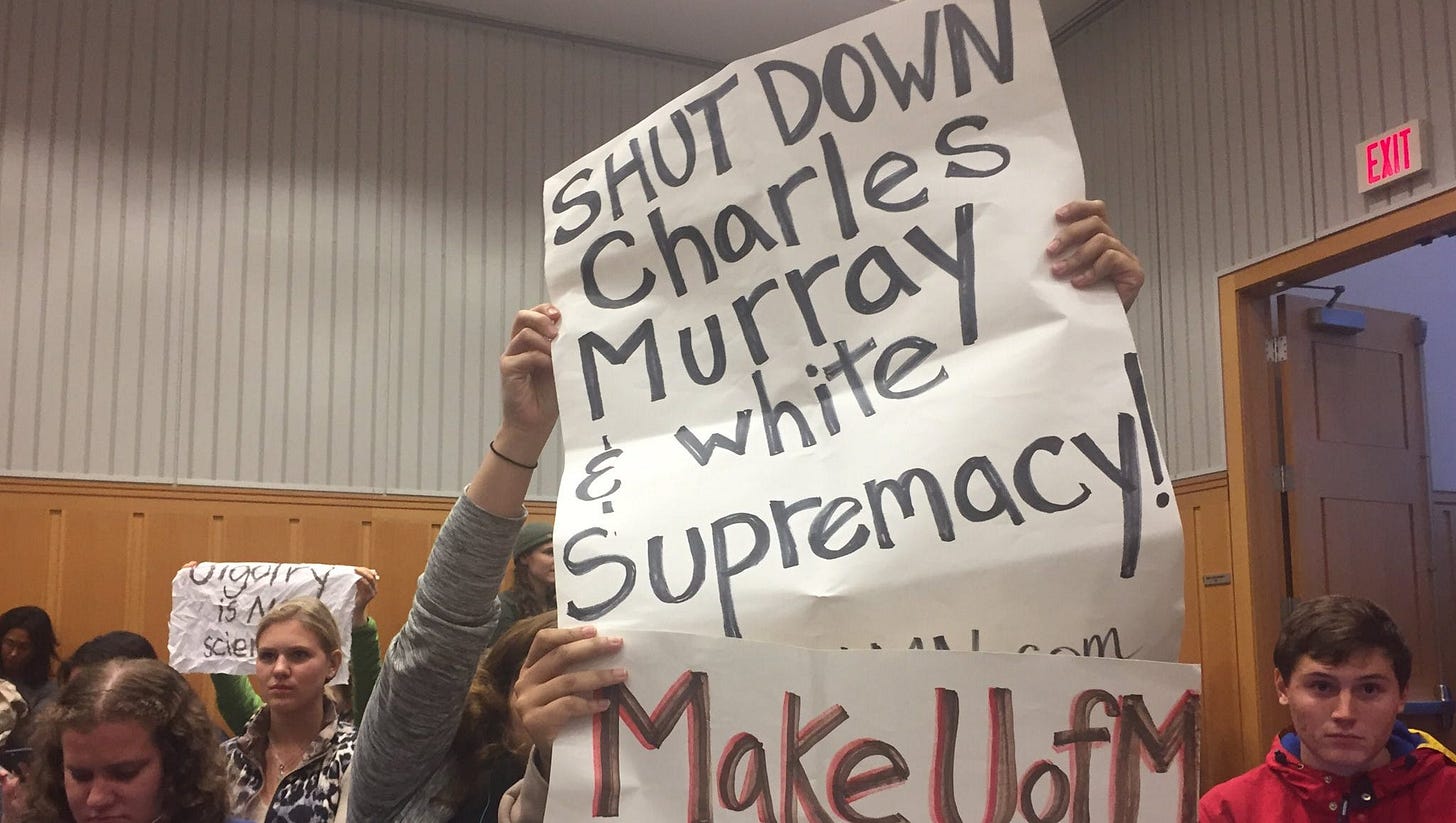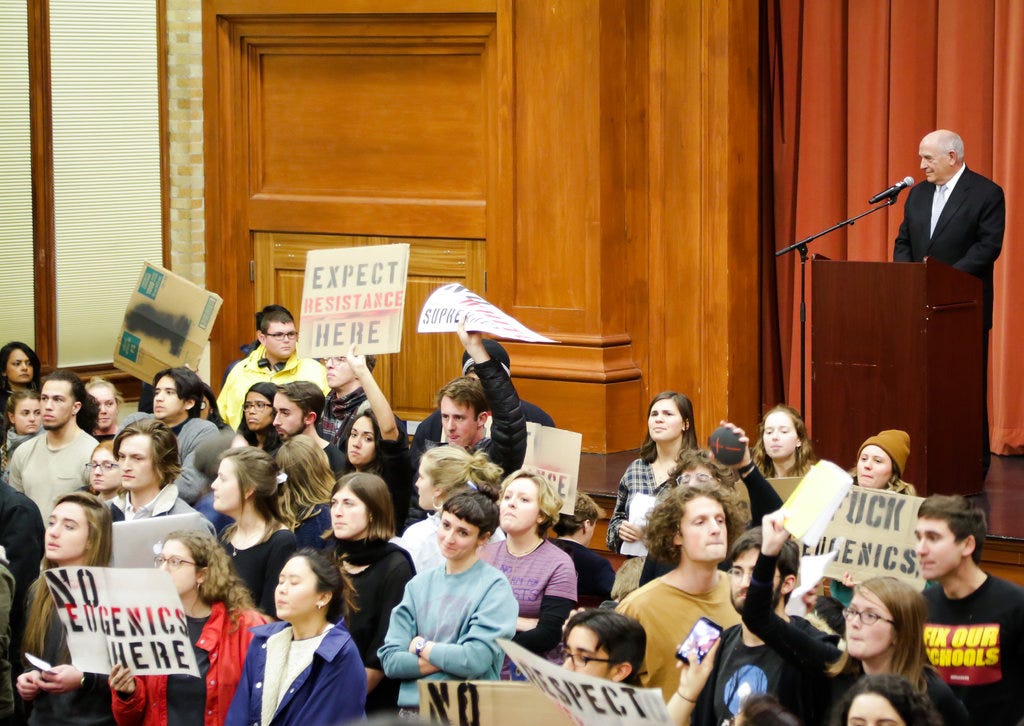Charles Murray Shouted Down At Middlebury College
Charles Murray is a political scientist, libertarian and author of many controversial books on the topics found in the Bell Curve. He is the W.H. Brady Scholar at the American Enterprise Institute. In discussing the hysteria around his work in an interview with NPR Host Michael Martin:
“Why did it (The Bell Curve) become so controversial? It is because IQ all by itself is kind of a flash-point, and IQ and race - if you put that into a book, even if it's one small part of a very long book, the book becomes about IQ and race.”
But The Bell Curve also argues that a 20th century trend in American society shows intelligence as a better predictor, than parental socioeconomic status or education level, of many individual outcomes. This includes income, job performance, pregnancy out of wedlock, and crime. In Murray’s view, social welfare programs and education efforts to improve social outcomes for the disadvantaged are largely counterproductive.
The implications of this work are compelling to say the least. These are important statistical discoveries but unfortunately it’s the race and gender elements most misrepresented and misunderstood, resulting in the validity of the larger body of Murray’s discoveries overshadowed and mired in controversy.
The level of anger directed at Charles Murray seems unreal when you read the work or listen to him defend it (instead of just shouting him down). Most of the criticism comes from people who seem not to actually read him. For activists it’s a mostly angry emotional experience to protest at a Charles Murray lecture.
But the unfair assessment and outrage comes from outside the walls of academia too. The Southern Poverty Law Centre has this to say about him:
“Charles Murray, a fellow at the American Enterprise Institute, has become one of the most influential social scientists in America, using racist pseudoscience and misleading statistics to argue that social inequality is caused by the genetic inferiority of the black and Latino communities, women and the poor.”
Charles Murray has made a career of committing the “crime” of pursuing “forbidden knowledge” in spite of activist’s shouting him down claiming his “eugenics adjacent” “racist pseudoscience” is rooted in “white supremacy.”
This strikes me as quite removed from the truth. He seems well aware of the sensitive nature of the subject matter he studies, having published several books on these controversial topics, he is careful and kind when discussing them. He is also academically rigorous and intensely detailed and thorough in his work. But some want him shut-down irregardless.
From 2020’s Human Diversity: The Biology Of Gender, Race, And Class, Murray writes:
“It is fundamentally wrong to think of the study of genetic population differences as an exercise in ranking populations from top to bottom. The questions to be explored are far more interesting, complex, and potentially more rewarding than filling out an ethnic scorecard.”
In March of 2017 an angry group of student (and non-student) protesters turned violent at the American school, Middlebury College, preventing Charles Murray’s scheduled lecture and Q&A session. Allison Stanger, a liberal professor who had planned the event, was injured when protestors pulled her hair and twisted her neck while she ushered Dr. Murray away from the danger. Left in a neck brace and devastated that the guest she invited had been so unfairly and violently shut down, she wrote the following anguished post on facebook:
"I want you to know what it feels like to look out at a sea of students yelling obscenities at other members of my beloved community. There were students and faculty who wanted to hear the exchange but were unable to do so, either because of the screaming and chanting and chair pounding in the room, or because their seats were occupied by those who refused to listen and they were stranded outside the doors.”
"I saw some of my faculty colleagues who had publicly acknowledged that they had not read anything Dr. Murray had written join the effort to shut down the lecture. All of this was deeply unsettling to me. What alarmed me most, however, was what I saw in student eyes from up on that stage. Those who wanted the event to take place made eye contact with me. Those intent on disrupting it steadfastly refused to do so. It was clear to me that they had effectively dehumanized me. They couldn’t look me in the eye, because if they had, they would have seen another human being. There is a lot to be angry about in America today, but nothing good ever comes from demonizing our brothers and sisters."
Chilling words. You don’t make eye contact during a social media pile-on either. Do we dehumanize the people we hate online first? Is that what makes it possible to deny their humanity in person? Before social media we seemed less likely to treat each other so coldly. Could our private online worlds, the ones that overlap with our friends, be giving us an inflated moral sense of righteousness that could explain, in some cases, this belligerent form of activism trampling on the freedoms of anyone who disagrees.
Defenders of Charles Murray are becoming more common. Glenn Loury has interviewed and defended him, as has Sam Harris and others. But reasonable people, even those holding issues with the basic premise of Charles Murray’s work, can agree his intellectual freedom permits him to pursue it. Can’t they?
This begs the questions; Why are some activist’s so fragile? Who do they think can’t handle the forbidden knowledge of Charles Murray? It's easier to silence him by labeling him a racist and shouting him down, than developing a full enough understanding of his work to construct an argument against it. But what isn’t clear is why those who disagree can’t just ignore his speaking engagements. No one is forcing them to attend. No one is harming them. They could stay away and be woke somewhere else, not trample the rights of public speakers and audiences. But they feel entitled and ideologically compelled to intervene.
Interestingly, Charles Murray argues for Universal Basic Income, an idea receiving growing support from both the left and right. Through equal distribution of social welfare, UBI (unlike other social programs such as Affirmative Action), can address rising inequality and persistent poverty. Proponents argue it doesn't require a large bureaucratic government apparatus to manage a complicated program and decide who’s worthy of assistance.
Universal Basic Income helps everyone equally, it's an easy idea to understand and an easy program for a small government agency to administer. Supporters of UBI feel it is the right step toward helping not just those below the poverty line, but many young and/or disenfranchised people (some having taken up Woke activism because “tearing down the structures” of a society that failed them is their best option).
Isn’t it time we get past all the confusion and hurt feelings and stop assuming researchers and scholars are white supremacists? No topic should be taboo. In the case of inquiry into the relationship between IQ-race, and in regards to the intentions of the academics doing this work, I’d like to close this section with another early 20th century quote from English psychologist Charles Spearman:
“Every normal man, woman, and child is a genius at something. It remains to be discovered what.”
This is the Eighth installment of “The Woke West: The Identity Politics, Cancel Culture, Radical Activism And Forbidden Knowledge Dividing The West...And What You Can Do About It!” - A book by James Pew, published serially to The Turn Substack.
Thanks for reading! Next Up, When Black Scholars Deal In Forbidden Knowledge: Why The Woke Pretend The Black Community Is Monolithic.






